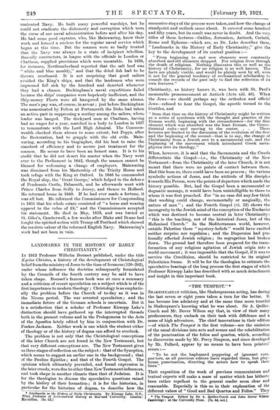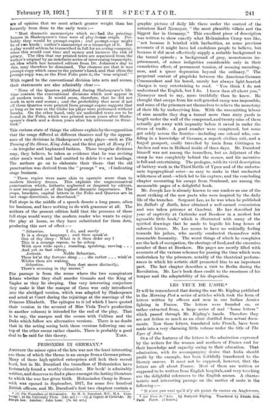"THE TEMPEST." * SHAKESPEAREAN criticism, like Shakespearean acting, has during
the last seven or eight years taken a turn for the better. It has become less adulatory and at the same time more trustful in Shakespeare's knowing what he was about. Sir A. Quiller- Couch and Mr. Dover Wilson say that, in view of their many predecessors, they embark on their task with diffidence and a sense of high adventure. The chief innovations in their edition —of which The Tempest is the first volume—are the omission of the usual divisions into acts and scenes and the rehabilitation of the punctuation of the folios and quartos, which, according to discoveries made by Mr. Percy Simpson, and since developed by Mr. Pollard, appear by no means to have been printers' errors :—
" To be not the haphazard peppering of ignorant com- positors, as all previous editors have regarded them, but play- house punctuation, directing the actors how to speak their lines."
Their exposition of the work of previous commentators and textual experts will make a mass of matter which has hithertc
been rather repellent to the general reader seem clear and reasonable. Especially is this so in their explanation of the different values of " Good and Bad Quartos and Folios." They
• The Tempest. Edited by Sir A. quiller-Couch and John Dover Wilson* Cambridge : at the University Press, (Th. aid. net.]
are of opinion that we must attach greater weight than has formerly been done to the early texts :- "Most dramatic manuscripts which reaaled the printing- houses in Shakespeare's time were of play-house origin. Pro- bably they would, be prompt-copies ; and prompt-copy might be of two Mnds : author's manuscript or a transcript of it. But a play would seldom be transcribed in full for an acting company, since this would cost time and money and increase the risk of piracy. The idea that our printed texts are separated from the author's original by an indefinite series of intervening transcripts, an idea which has haunted editors from Dr. Johnson's day to this, may therefore be dismissed. The chances are that it was prompt-copy which came to the printer's hand, and that often the prompt-copy was, as the First Folio puts it, the ' true original.' " With regard to the conventional division into acts and scenes, their statements are also admirably clear :— " None of the Quartos published during Shakespeare's life- time contain the conventional divisions which now appear in all modern texts. It would seem, therefore, that he did not work in acts and scenes ; and the probability that most if not all these Quartos were printed from prompt-copies suggests that as long as he was at the Globe his plays were performed without breaks. On the other hand, only six undivided texts are to be found in the Folio, which was printed seven years after Shake- speare's death and a dozen years after his retirement to Strat- ford."
This curious state of things the editors explain by the supposition that the usage differed at different theatres and by the appear- ance of the divisions in Shakespeare's early plays—such as The Taming of the Shrew, King John, and the first part of Henry IV. —in irregular and haphazard fashion. These irregular divisions may, they believe, be taken as evidence that he was revising other men's work and had omitted to delete ti e act headings. The authors go on to elaborate their them, that the old punctuation was derived from the " prompt " wa, e f indicating stage business.
" These copies were more akin to operatic score than to modern literary drama. This explains the ungrammatical punctuation which, hitherto neglected or despised by editors, is now recognised as of the highest dramatic importance. The stops, brackets, capital letters in the Folio and Quartos are in fact stage-directions, in shorthand."
Full stops in the middle of a speech denote a long pause, often for business, and have nothing to do with grammar at all. The authors of the present edition hold that the presence of these full stops would worry the modern reader who wants to enjoy the play at home, so they have substituted for them dots, producing this sort of effect :- " Sebastian. I do, and surely It is a sleepy language and thou speak'st Out of thy sleep : What is it thou didst say ? This is a strange repose, to be asleep With eyes wide open ; standing, speaking, moving . . And yet so fast asleep. Antonio. Noble Sebastian,
Thou let'st thy fortune sleep . . . die rather . . . wink'st Whiles thou art waking.
Sebastian. Thou dolt snore distinctly, There's meaning in thy snores."
f he passage is from the scene where the two conspirators iebate whether they shall murder Gonzalo and the King of Naples as they lie sleeping. One very interesting conjecture they make is that the masque of Ceres was only introduced into the abridged version, which was adapted by Shakespeare and acted at Court during the rejoicings at the marriage of the Princess Elizabeth. The epilogue to it (of which I have quoted their version in the account of Miss Viola Tree's production in another column) is intended for the end of the play. That is to say, the masque and the scenes with Caliban and the Duke which follow are alternative versions. There is no doubt that in the acting seeing both these versions following one on top of the other seems rather chaotic. There is probably a good



































 Previous page
Previous page